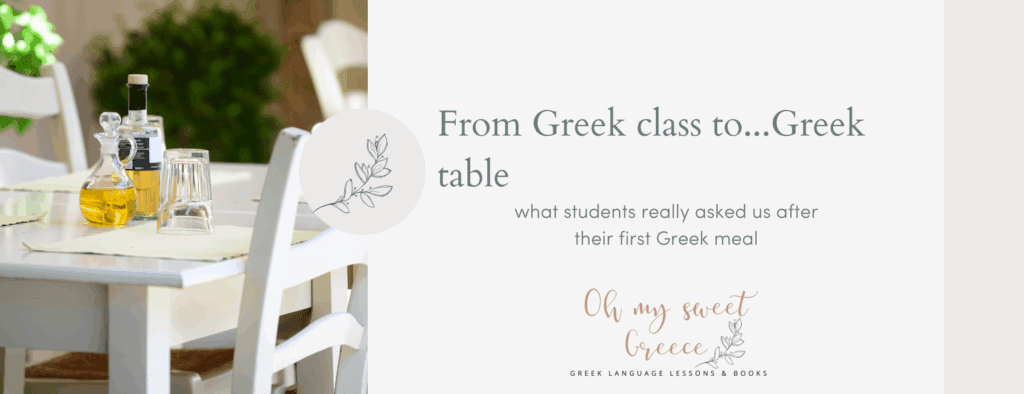
From Greek class to...Greek table!
Table of contents
One of the most rewarding moments in learning Greek is being able to use it in real life, like when you sit down at a local taverna and place your order in Greek. But even if you’ve prepared the vocabulary, the phrases that you expect you’ll hear or need to use, there are always a few little phrases or habits that don’t quite match what you’ve learned in the textbook. 😕
That’s something we’ve seen time and again in our classes.
Students come back from dinner with questions like:
“What exactly is ‘κρασί χύμα’?” or “Why did the waiter ask me about cheese?”
These are exactly the moments we love! When language learning connects directly to daily life.
So we’ve gathered a few real-life tips that came up in recent lessons, to help you feel more confident and connected the next time you dine out in Greece. Think of this as your practical companion for the Greek table.
Asking for sparkling water
In Greece, most people drink still water, especially at tavernas. But if you’re a sparkling water fan, you’ll want to know this:
we call it “ανθρακούχο νερό.”
It’s not always available, but… it doesn’t hurt to ask!
Sharing is caring: say “για τη μέση”
Let’s say you’re out with friends and planning to share a bunch of dishes (which is very Greek, by the way).
Instead of explaining, you can simply say: “για τη μέση.”
This literally means “for the middle,” and it’s the go-to phrase to let the waiter know you’re doing a shared-style meal.
Example:
Θα πάρουμε μια χωριάτικη, μια φάβα και ένα καλαμάρι για τη μέση.
(We’ll have a horiatiki, a fava, and a calamari to share.)
Grated cheese? Say yes. Always.
When you order μουσακά or παστίτσιο , don’t be surprised if the waiter leans in and asks:
“Να σας φέρω τριμμένο τυρί;”
That means: Shall I bring you grated cheese?
The answer is yes. Always yes!
[τριμμένος, -η, -ο means “grated” and τυρί means “cheese.” ]
What is “κρασί χύμα” and why is it everywhere?
Scanning a taverna menu, you might see “κρασί χύμα” and wonder if that’s a brand you’ve never heard of. It’s not.
“Χύμα” means “bulk” or “loose,” and in this case, it refers to house wine served from a barrel or large container, not a bottle.
It’s local, it’s affordable, and in many places, it’s really good.
🍷 You can ask:
“Τι κρασί χύμα έχετε;” – What house wine do you have?
Usually, the options are simple: white (λευκό), red (κόκκινο), or sometimes rosé.
Final thoughts
Learning Greek doesn’t happen only in the classroom—or only in real life. The real magic happens when the two come together.
You might study vocabulary in a lesson, and then hear that exact phrase at a taverna later that evening. Or you might have a confusing moment at dinner that suddenly makes perfect sense once you bring it back to class.
That’s how language sticks: through a mix of structure and spontaneity, books and baklava, practice and play.
And that’s exactly the kind of learning experience we create at Oh My Sweet Greece—a space where Greek makes sense both on the page and at the table.
🎯 Want to see how it works?
Book a free trial lesson and start connecting the dots between real life and real learning.
We’d love to meet you!
Are you learning Greek and want more helpful cultural insights?
Join our boutique Greek language courses at Oh my sweet Greece, where we focus on practical language skills alongside authentic cultural experiences.
…and if you enjoy getting the latest posts and exclusive content delivered straight to your inbox, we’d love for you to subscribe to our newsletter!
